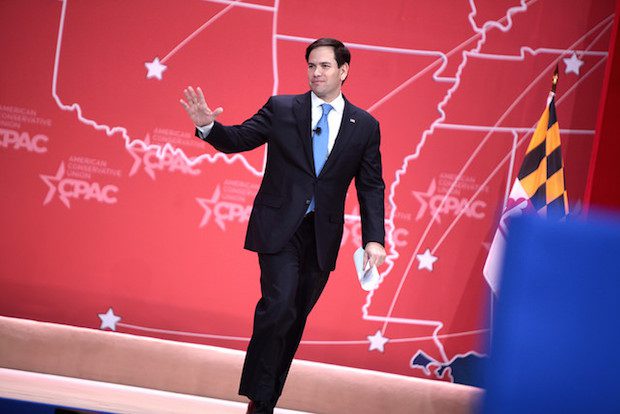Marco Rubio’s Ideas Aren’t New

Since John F. Kennedy succeeded Dwight Eisenhower, it’s seemed almost like an unwritten rule of American politics that Republicans are supposed to be old and Democrats young. In 1984, Ronald Reagan joked about a 56-year-old opponent’s youth and inexperience.
Marco Rubio would like to flip that script. The Florida senator is the latest entrant into the 2016 sweepstakes, a man in his early 40s vying for the chance to run against a Democrat who reminds us that grandmothers know best. Rubio was actually born the year Bill and Hillary Clinton started dating. He looks even younger.
Is there anything new to Rubio’s politics? Elected to the U.S. Senate after nine years in the Florida state legislature, including two as house speaker, he was part of the 2010 Tea Party wave. Rubio was so successful that the establishment candidate he challenged for the senatorial nomination, then-Gov. Charlie Crist, left the party entirely.
Rubio has associated himself with some of the creative domestic-policy ideas championed by fellow freshman Republican Sen. Mike Lee of Utah, including an expanded child tax credit and other “family-friendly” tax reforms. The Rubio-Lee tax plan seeks to update supply-side economics for the 21st century rather than responding to the problems of 1980.
The senator has at times spoken candidly about the mathematic challenges facing the major entitlement programs now that Hillary’s generation is starting to retire. Social Security and Medicare as presently constituted are going to have problems paying for the promises the political class has made.
Rubio can also speak compellingly about the American immigrant experience, something the party has lacked in recent election cycles (even if some of the details of Rubio’s family story may have been embellished). Whatever the merits of his policies, the rhetoric of Rubio’s conservatism is aspirational and uplifting rather than pessimistic or obsessed with green-eyeshade accounting.
In many respects, Rubio is a Republican consultant’s dream candidate: Hispanic, relatively young, a solid orator, from a key swing state with a large number of electoral votes. All these attributes work well with the Republican donor class too.
But Rubio has many problems, too. His advocacy of the Gang of Eight immigration plan has not only tarnished his conservative brand, a liability he is less able to afford than John McCain or George W. Bush. It suggests he is committed to a loose immigration policy that will undermine the affordable family formation he seeks to promote through his tax policies.
Similarly, Rubio has pushed for increased defense spending even when it means increasing the deficit. While he opposed the Obama administration’s abortive Syria mission in 2013 when the party rank-and-file was lopsidedly against a new war, he has generally been hawkish on everything else.
Rubio has blasted Rand Paul as a “cheerleader” for Barack Obama’s foreign policy. But Rubio sided with the president and Hillary Clinton on the ill-fated Libya war. He is a booster of NSA surveillance programs even Ted Cruz wants to reform. He is one of the Senate’s leading Iran hawks.
The risk with Rubio is that whatever money the federal government would save with his entitlement reforms would need to be sunk into his costly activist foreign policy. He’s a more eloquent defender of the Bush Doctrine than Bush or McCain.
Will that be enough to sell the party on continuing to promote old ideas with a new face? People who have described one-on-one encounters with Rubio to this writer have almost uniformly been blown away or thoroughly unimpressed, with few reporting reactions in between.
Rubio is certainly a more impressive candidate than McCain or Lindsey Graham, and more recognizably conservative on issues other than foreign affairs and national defense. His approval rating in Florida is anemic and his poll numbers both nationally and in the early states aren’t very good, though a strong campaign launch could potentially change that.
No other candidate is more hurt by Jeb Bush’s entry into the presidential race. The two share some donors and Bush’s presence makes it harder for Rubio to count on a win in Florida, which would be helpful given his low standing in places like Iowa and New Hampshire.
Rubio’s admirers believe if enough grassroots Republicans hear their candidate speak, they will fall in love with him. Let the romancing begin.
W. James Antle III is managing editor of the Daily Caller and author of Devouring Freedom: Can Big Government Ever Be Stopped?
Comments